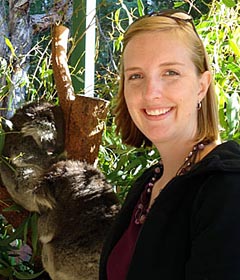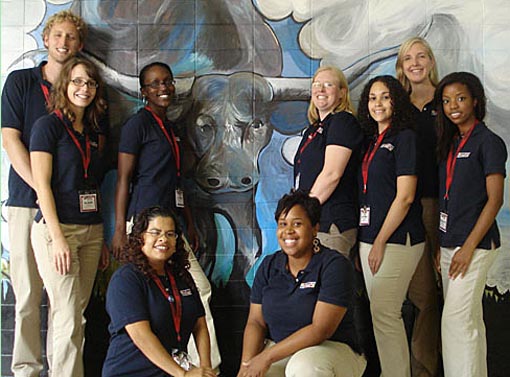Alumna in Australia Offers a Boost to U.S. Schools
By Matt Windsor
 UAB alumna Mandy Gandin was the university's first participant in the prestigious Teach for America program. Today, she helps low-performing schools in Texas make the grade—from her home in Australia.You may think you have a killer commute, but this is ridiculous: It’s roughly 10,000 miles from Mandy Haeuser Gandin’s house in Perth, Australia, to her workplace in Texas. Luckily, the 2004 UAB graduate usually gets to phone it in—or Skype it in, to be precise. Gandin, who moved to Perth because of her husband’s job with a major American energy company, is a consultant for Citizen Schools, a Texas-based organization that designs and implements interventions for low-performing schools across the United States.
UAB alumna Mandy Gandin was the university's first participant in the prestigious Teach for America program. Today, she helps low-performing schools in Texas make the grade—from her home in Australia.You may think you have a killer commute, but this is ridiculous: It’s roughly 10,000 miles from Mandy Haeuser Gandin’s house in Perth, Australia, to her workplace in Texas. Luckily, the 2004 UAB graduate usually gets to phone it in—or Skype it in, to be precise. Gandin, who moved to Perth because of her husband’s job with a major American energy company, is a consultant for Citizen Schools, a Texas-based organization that designs and implements interventions for low-performing schools across the United States.
This isn’t exactly how Gandin envisioned her career path. She came to UAB in 2001 as an elite synchronized swimmer from Texas and earned a spot as captain of the university’s synchronized swimming team in 2003 and 2004. She led the squad to a third-place finish at the national championship meet and won three All-American awards. Out of the pool, Gandin was a member of the University Honors Program and president of the Economics Club. She earned an economics degree with a mathematics minor in three years, graduating summa cum laude.
Instead of a career in banking or finance, however, Gandin returned to Texas to teach fourth-grade science and social studies in a low-performing elementary school. She was the first student from UAB accepted into the prestigious Teach for America (TFA) program, which recruits recent college graduates to spend two years teaching in low-income communities across the country.
It’s a tough job for a young person just beginning his or her career, but there are plenty of eager applicants. Although roughly 50,000 students apply each year, less than 15 percent are admitted. Gandin was a trailblazer; to date, 11 additional UAB students have been selected for TFA, including Ebony Hinton in 2012.
Gandin is proud of that legacy and eager to share her enthusiasm for the transformative power of education.
UAB Magazine: What led you to Teach for America?
Gandin: During the summer after my junior year in college, I participated in a program in Washington, D.C., where I met some great friends. One of those friends joined TFA the following year and was placed in the Rio Grande Valley of Texas. I visited her and was really excited by the program and her work in the community. So I applied to TFA, and was accepted and placed in the Rio Grande Valley as well.
UAB Magazine: What was it about the program that attracted you?
Gandin: I had always felt led to do something that would give back to the community in some way. I had done an internship with Sloss Realty [in Birmingham] and was fascinated by social entrepreneurism and the many ways business leaders were applying business principles to make the world a better place. I didn’t know which direction I would take, but I knew I wanted to be a part of some endeavor that provided resources and opportunities to people who weren’t afforded them otherwise.
I thought that might be in urban development or perhaps micro-enterprise—but it turned out to be in education. I thought I would teach later in life, but when I learned about TFA, it seemed like the perfect fit. Education is the key to breaking the cycle of poverty, which in turn is the key to bettering our whole society.
UAB Magazine: How did UAB contribute to that evolution?
Gandin: Ada Long was the honors program director during my years there, and she was—and has continued to be—a close mentor in my life. Without her guidance I probably wouldn’t have participated in that summer program in D.C. or applied to TFA—both key steps that put me on this path. Mike Sloane [current director of the University Honors Program] also has been a continual friend and support. [Economics professor] Sarah Culver was also hugely supportive and encouraging. Additionally, Lisa Riddel, then the coach of the synchronized swimming team, and my teammates provided a unique network of support during my development at UAB. It was a great combination of support, unique perspectives, and an atmosphere of growth.
(Story continues below the image)
 Gandin (second from right) and her 2009-2010 Citizen Schools Texas staff at Jane Long Middle School in Houston, Texas
Gandin (second from right) and her 2009-2010 Citizen Schools Texas staff at Jane Long Middle School in Houston, Texas
UAB Magazine: How did you become involved with Citizen Schools?
Gandin: Citizen Schools is part of the nationwide education reform movement and operates in seven states. We partner with low-performing middle schools as part of the turnaround effort; we expand the school day for (typically) the sixth grade at the school. We provide an additional three hours of hands-on education for the students each day via a second shift of educators that we hire, train, and support.
We know that in more affluent communities, students receive these resources via their families and extracurricular activities. If they are behind academically, parents provide a tutor after school, for example. In lower-income areas, families often don’t have the means to do that. We help low-performing schools in low-income areas provide these resources and opportunities to the students. This allows the school and teachers to focus on the academics and, as a whole, function more effectively.
I was hired to found a Citizen Schools program at Jane Long Middle School in Houston in 2007. I led that program through 2010. The program initially started with around 75 students and grew to 120 under my leadership. From there I was promoted to managing director of programs for the state and managed four sites—two in Houston and two in Austin—during the 2010-2011 school year.
My work was primarily to manage and support the programs and the staff who run them. I loved working with all parties involved—the staff, the principals, the teachers, the students, the families, and the volunteers. In fact, I think the variety is what I love most—I love the power of bringing together many different facets of a community to make magical things happen, to broaden kids’ horizons, and ultimately to provide access and opportunity to a whole community. It is transformative for everyone.
UAB Magazine: So how did you end up in Australia?
Gandin: My husband was accepted into a development program where he will do four different jobs in four different locations over the course of two years. The first rotation was in Houston, and the second is here in Perth.
UAB Magazine: What’s it like to work half a world away from where you live?
Gandin: It’s really exciting! When we found out we would be moving away from Houston, I transitioned from managing director of programs to a consultant role where I have the opportunity to work on many different projects remotely. I still work with the Citizen Schools Texas team, but now I focus mostly on team dynamics, strategy, and work planning for growth in the region. I also work with our National Program Department to redesign our summer training for our new teaching staff, write curricula for our college- and career-readiness courses, and assist with research on the different assessment programs in the states where we operate. It’s fascinating work and all easily done from my computer.